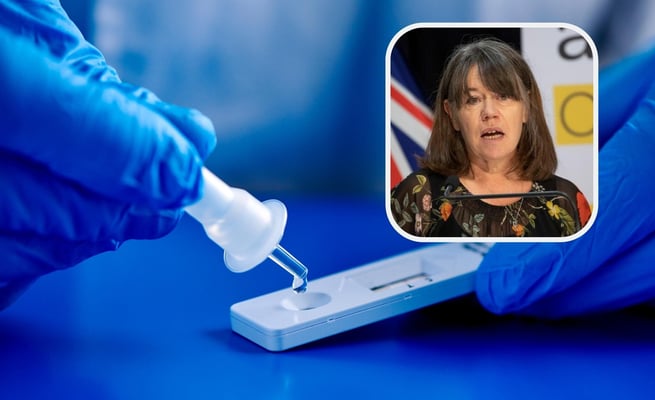Ministry of Health fronts as Covid-19 patients flood hospitals

McElnay says Aucklanders yesterday recorded their highest number of rapid antigen results ever, 43,735 - some 25 percent higher than the previous highest day, last Monday.
She says there are 756 people in hospital with Covid-19. The actual number of cases in the community is expected to be considerably higher, but this is hard to gauge when using rapid antigen testing as the primary test. This is why the ministry is focusing on hospitalisations.
Hospitalised numbers in Auckland are about the same as they were yesterday, she says, and ICU numbers are also similar to yesterday. The DHBs report continued pressure on staffing, particularly with cover through the night, she says, but occupancy levels remain manageable.
McElnay says the lesser severity in comparison to the Delta outbreak is strongly related to the highly-vaccinated status of the New Zealand population.
Unvaccinated people are four times overrepresented in current hospitalisation data, she says. Just 3 percent of eligible people aged over 12 have had no doses of the vaccine, but 17 percent of people hospitalised since community transmission of Omicron was detected were unvaccinated.
Just 1.6 percent of cases were in ICU on Sunday, 6 March, which compares with 13.6 percent in ICU on 10 November during the Delta outbreak last year when the percentage was highest.
McElnay says health services are stretched, with large numbers of staff being required to isolate.
Doctors are stepping in to help cover nursing shifts at Auckland's Middlemore Hospital, which is grappling with critical staff shortages.
There are nearly 200 people with Covid-19 in the hospital and hundreds of frontline staff off because of the virus.
And Hawke's Bay Hospital has had to scale back some of its services and operations, as the number of Covid-19 patients in the hospital grows.
McElnay says one thing put in place to address this is allowing critical healthcare workers who have Covid to return to work earlier than usual if their absence would mean a critical health service would stop functioning.
"This can only occur if the case meets strict criteria and all steps are taken to protect the safety and wellbeing of the staff themselves, their patients and other staff."
She says there are two pathways available for these people - critical healthcare workers can return six days after two negative RAT tests, and the second allows Covid-positive staff to return to work on wards where all the patients are also Covid-positive with no stand-down period.
McElnay says this allows the health system to keep functioning.
McElnay says Aucklanders yesterday recorded their highest number of rapid antigen results ever, 43,735 - some 25 percent higher than the previous highest day, last Monday.
She says there are 756 people in hospital with Covid-19. The actual number of cases in the community is expected to be...
McElnay says Aucklanders yesterday recorded their highest number of rapid antigen results ever, 43,735 - some 25 percent higher than the previous highest day, last Monday.
She says there are 756 people in hospital with Covid-19. The actual number of cases in the community is expected to be considerably higher, but this is hard to gauge when using rapid antigen testing as the primary test. This is why the ministry is focusing on hospitalisations.
Hospitalised numbers in Auckland are about the same as they were yesterday, she says, and ICU numbers are also similar to yesterday. The DHBs report continued pressure on staffing, particularly with cover through the night, she says, but occupancy levels remain manageable.
McElnay says the lesser severity in comparison to the Delta outbreak is strongly related to the highly-vaccinated status of the New Zealand population.
Unvaccinated people are four times overrepresented in current hospitalisation data, she says. Just 3 percent of eligible people aged over 12 have had no doses of the vaccine, but 17 percent of people hospitalised since community transmission of Omicron was detected were unvaccinated.
Just 1.6 percent of cases were in ICU on Sunday, 6 March, which compares with 13.6 percent in ICU on 10 November during the Delta outbreak last year when the percentage was highest.
McElnay says health services are stretched, with large numbers of staff being required to isolate.
Doctors are stepping in to help cover nursing shifts at Auckland's Middlemore Hospital, which is grappling with critical staff shortages.
There are nearly 200 people with Covid-19 in the hospital and hundreds of frontline staff off because of the virus.
And Hawke's Bay Hospital has had to scale back some of its services and operations, as the number of Covid-19 patients in the hospital grows.
McElnay says one thing put in place to address this is allowing critical healthcare workers who have Covid to return to work earlier than usual if their absence would mean a critical health service would stop functioning.
"This can only occur if the case meets strict criteria and all steps are taken to protect the safety and wellbeing of the staff themselves, their patients and other staff."
She says there are two pathways available for these people - critical healthcare workers can return six days after two negative RAT tests, and the second allows Covid-positive staff to return to work on wards where all the patients are also Covid-positive with no stand-down period.
McElnay says this allows the health system to keep functioning.









Leave a Comment